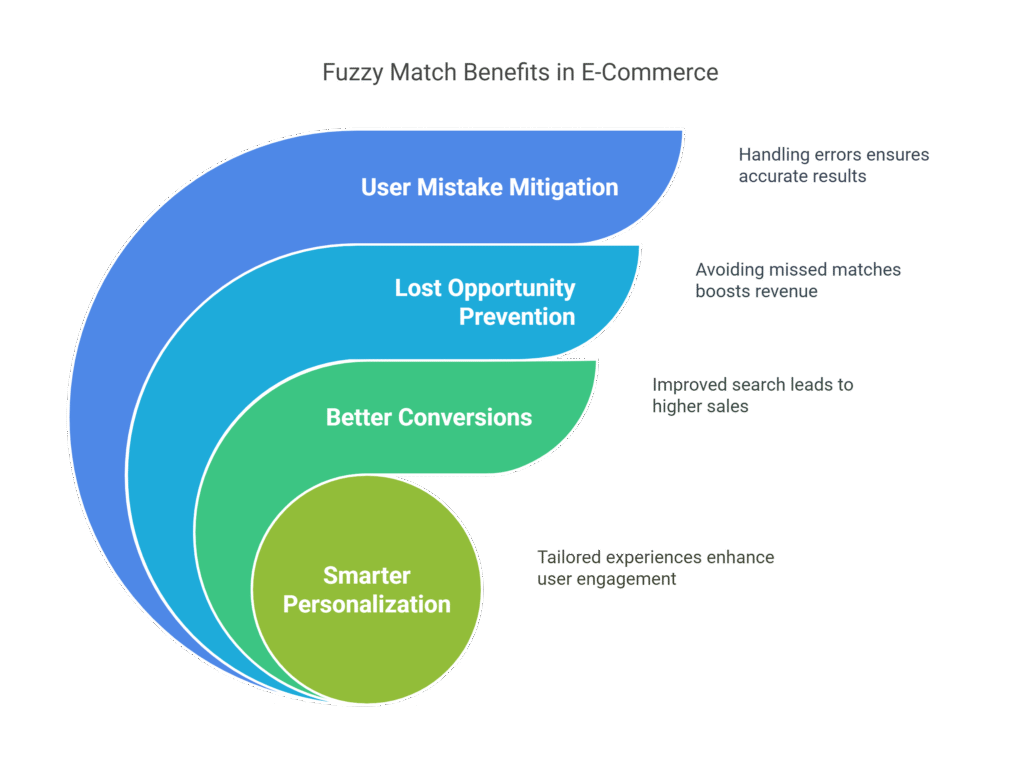Ever searched for “nikes” instead of “Nike” or “blu tooth” instead of “Bluetooth”? You’re not alone — and if your site search doesn’t know what users meant, not just what they typed, you’re losing sales.
Enter fuzzy match — the behind-the-scenes AI that makes sure a typo doesn’t kill a transaction. In e-commerce, where every query is a potential conversion, fuzzy matching ensures your site understands shopper intent, even when the input isn’t perfect.
Let’s explore what fuzzy match is, why it matters, and how search engines like Expertrec use it to improve product discovery and revenue.
What Is Fuzzy Match?

Fuzzy match (or fuzzy search) is a search technique that identifies results that are similar — but not identical — to the user’s input. It accounts for:
- Typos
- Misspellings
- Word variations
- Extra or missing characters
Instead of showing a dead end when a user types “sneekers,” fuzzy search still returns “sneakers.” It’s all about matching intent, not just exact strings.
Why Fuzzy Match Matters in E-Commerce

1) Users Make Mistakes — A Lot
Whether they’re in a rush, on mobile, or non-native speakers, users frequently mistype. Fuzzy match ensures they still get relevant results.
2) Every Missed Match Is a Lost Opportunity
If your site can’t interpret common errors, you’re leaving money on the table — especially for long-tail or branded queries.
3) Better Search = Better Conversions
Smart search keeps users engaged longer, reduces frustration, and drives up conversion rates — particularly in large catalogs.
4) It Feeds Smarter Personalization
Fuzzy logic provides richer behavioral data by recognizing how users search and what they actually mean.
How Fuzzy Match Works (Without Getting Too Technical)
Behind the scenes, fuzzy search uses algorithms like:
- Levenshtein Distance: Measures how many character edits (insertions, deletions, substitutions) are needed to match two strings.
- Phonetic Matching: Matches words that sound alike even if spelled differently.
- Synonym Handling: Maps related or equivalent terms even if spelled correctly.
These methods are combined with machine learning to improve over time based on real user behavior.
Examples of Fuzzy Match in Action
| User Query | What They Probably Meant | Result Delivered |
|---|---|---|
| “nikes shoes” | “Nike shoes” | Nike product results |
| “bleutooth spkr” | “Bluetooth speaker” | Relevant electronics |
| “sofa cum bed” | “sofa bed” | Convertible furniture |
| “wrking shoes” | “working shoes” | Work footwear results |
Want Fuzzy Match Without the Complexity?
If you’re looking to add fuzzy logic to your site search without writing algorithms yourself, Expertrec is worth considering. It handles:
- Typo-tolerance and autocomplete
- Intelligent synonym mapping
- Multi-language and phonetic search support
- Real-time indexing and ranking of near-matches
It’s not just about showing results — it’s about showing the right results, even when the input isn’t perfect.
Conclusion: Don’t Let Typos Cost You Conversions
Fuzzy match is no longer a nice-to-have — it’s a critical piece of search UX. In e-commerce, it can mean the difference between a bounce and a buy.
With tools like Expertrec, you don’t need to build it from scratch. You just need to make sure every query — perfect or not — leads to a product your customer might love.
Frequently Asked Questions
1) What is fuzzy match in search?
It’s a search feature that finds close matches for misspelled or imprecise queries, improving relevance and results.
2) Is fuzzy search good for e-commerce?
Absolutely. It reduces friction in product discovery, especially when users mistype or use alternate terminology.
3) Does Expertrec support fuzzy search?
Yes. Expertrec includes typo handling, synonym detection, and intelligent query suggestions as part of its AI-powered search engine.
4) Will fuzzy search slow down my site?
Not with Expertrec. It’s built for speed and optimized for large catalogs.
5) Can fuzzy match be customized?
Yes. You can adjust tolerance levels, tune synonym lists, and prioritize product categories based on your goals.




